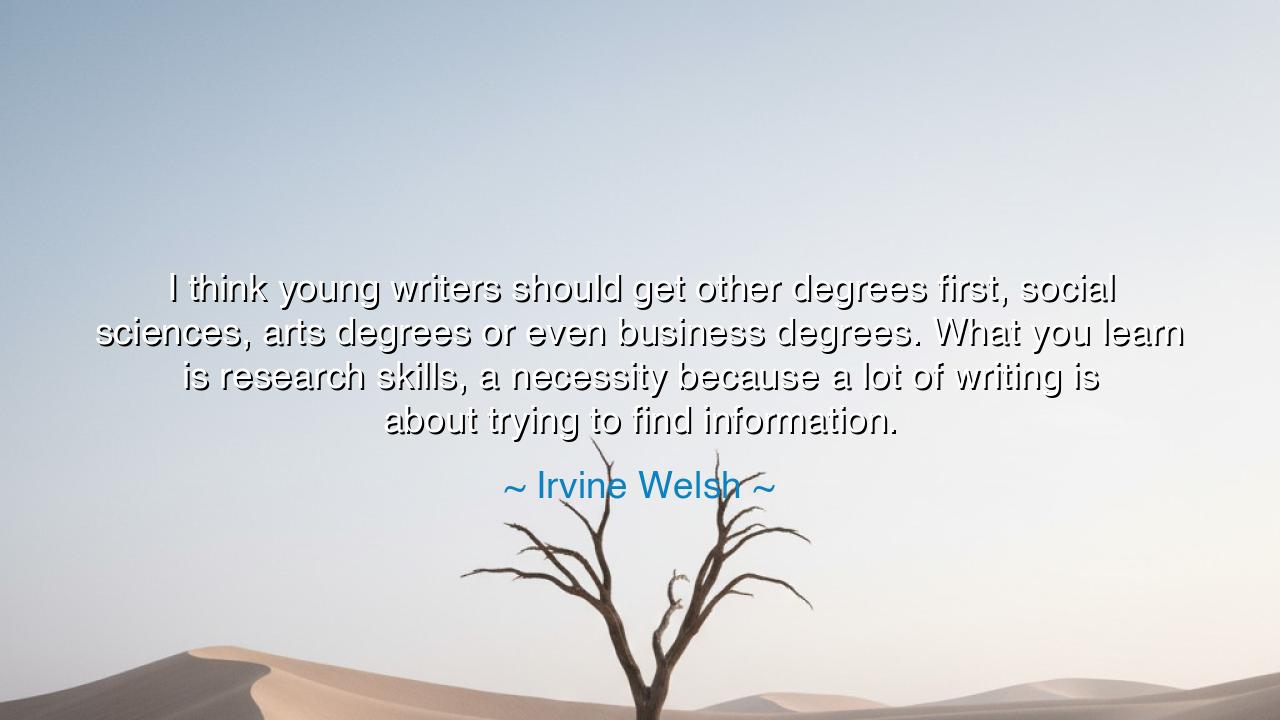
I think young writers should get other degrees first, social
I think young writers should get other degrees first, social sciences, arts degrees or even business degrees. What you learn is research skills, a necessity because a lot of writing is about trying to find information.






Hearken, children of imagination, to the counsel of Irvine Welsh, who declared with keen wisdom: "I think young writers should get other degrees first, social sciences, arts degrees or even business degrees. What you learn is research skills, a necessity because a lot of writing is about trying to find information." In this guidance lies a profound truth about the craft of writing: it is not born solely of imagination, but of the disciplined cultivation of knowledge, observation, and inquiry. To be a writer is to be a seeker, a chronicler of truths hidden in the shadows of experience.
The origin of Welsh’s advice rests upon his understanding of the writer’s vocation as both artist and investigator. To immerse oneself only in the act of writing without broader study is to wander the world half-blind. By first engaging with social sciences, arts, or business, the young writer learns the tools of observation, analysis, and synthesis. These are the instruments of research, the very lifeblood of stories that are rich, accurate, and compelling. Writing, he reminds us, is a dialogue with the real world as much as with one’s own mind.
Consider the story of Gabriel García Márquez, who, before crafting the magical realism of One Hundred Years of Solitude, worked as a journalist. His immersion in politics, culture, and human stories equipped him with the research skills and understanding of society that would infuse his fiction with truth and depth. Like Welsh suggests, the acquisition of knowledge beyond the narrow craft of writing empowers the storyteller to illuminate reality with precision and imagination alike.
The lesson is ancient in its resonance: the pursuit of wisdom and skill must precede the mastery of expression. In the libraries of Alexandria, scribes studied philosophy, mathematics, and astronomy before committing their words to scrolls that would endure through centuries. Knowledge is the foundation upon which art rests; the degree in another field is not a detour, but a forge where intellect and perception are tempered for the writing that will follow.
Writing is, at its heart, an act of discovery. Much of it is research, investigation, and inquiry, a relentless pursuit of truth in its myriad forms. To understand a character, a society, or a historical moment requires more than imagination—it requires skill in finding and interpreting information. Welsh’s insight reminds us that the most resonant stories are those grounded in knowledge, for information and observation breathe life into fiction.
Moreover, studying fields beyond writing fosters empathy and breadth of perspective. To engage with business, arts, or social sciences is to encounter struggles, ambitions, and worldviews that expand the writer’s palette. It is this diversity of insight that transforms mere words into narratives that resonate across time and culture, giving the audience not just entertainment, but understanding.
The lesson for aspirants is clear: cultivate curiosity, embrace multidisciplinary study, and value research as a sacred tool of creation. Writing is not solely the stroke of genius at midnight; it is the patient, disciplined pursuit of knowledge, the unearthing of truths both hidden and overlooked, and the shaping of them into story. Welsh teaches that preparation—through study, investigation, and breadth of experience—is what empowers the artist to write with authenticity and power.
Practical actions flow from this wisdom: pursue degrees or studies in fields that broaden your perspective; actively develop research skills through practice and inquiry; read not only literature, but also history, sociology, and sciences; and treat every encounter, every text, every experience as material for your craft. In doing so, the young writer transforms research into imagination, knowledge into narrative, and learning into enduring art.






AAdministratorAdministrator
Welcome, honored guests. Please leave a comment, we will respond soon